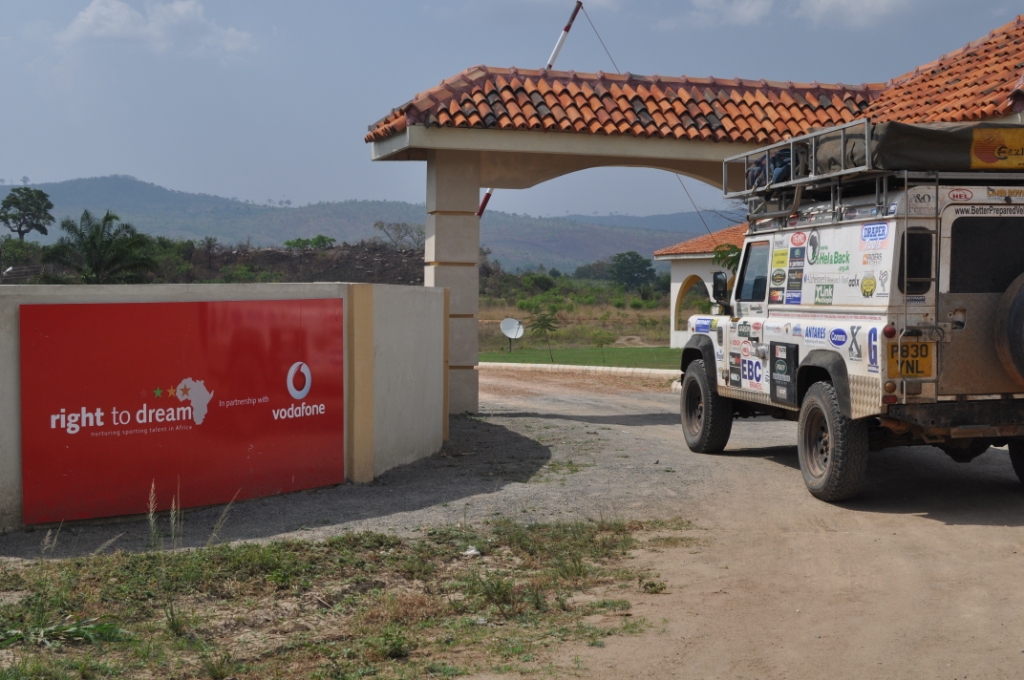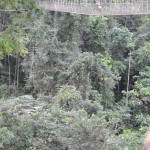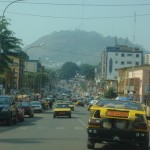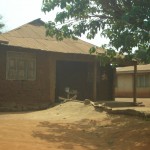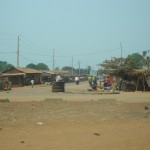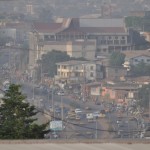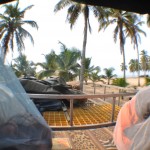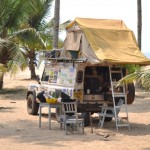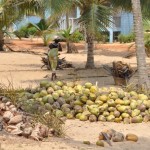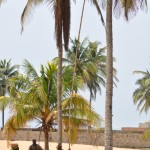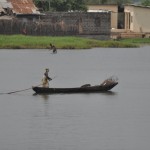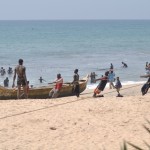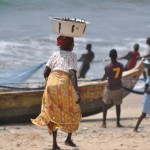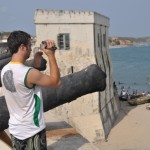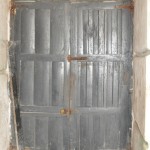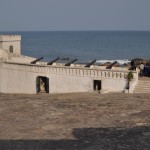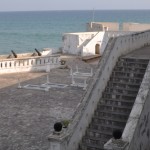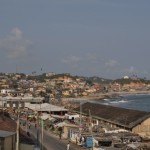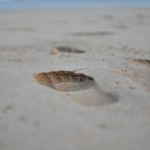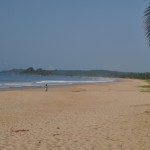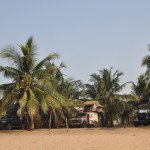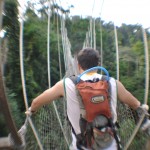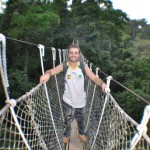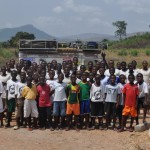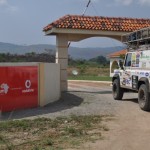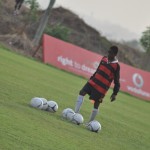After a highly enjoyable few weeks in Cameroon we bumped, pitched and rolled along the final 50 miles to the border from Mamfe towards Nigeria. We were nervous, but not overly so.
Many times already on this trip have we approached countries of mixed reputation and troubled recent history only to have wonderful, friendly and trouble-free experiences. Libya, Sudan, Zimbabwe, Angola and DR-Congo all fit into this category and we hoped that in a few days time we could add Nigeria to that list.
Despite a precedence set for us entering countries with completely wrong preconceptions, Nigeria had one additional factor against it – there was only one place we wanted to visit: centrally placed Benin City. Having already sorted our Benin visas, we had no need to go to Abuja and planned to drive straight through.
After speaking to five or six other European travellers who had just driven through, we decided on taking the Southern motorway, before diverting slightly North on the Western border to avoid Lagos. We were aware of the need to stay away from the Delta region due to continual kidnappings of westerners and armed robbery. We also wanted to pass south of Jos, where hundreds had reportedly died in the last couple of weeks due to clashes between Muslims and Christians.
Things started well at the border crossing, with the Cameroonian officials encouraging us to ride their police motorbikes (which we declined) and the Nigerian immigration officers very keen for a laugh and a joke.
Entering Nigeria, we employed the tried and trusted THAB ‘This country is wonderful; those guys over the border are rubbish’ ingratiation technique.
When asked by the Nigerian authorities about the quality of roads in Cameroon, we obliged their obvious enthusiasm for xenophobic humour and regaled them with stories of potholed roads, dust tracks and gravel traps.
They howled with laughter, before assuring us that our tarmac troubles would now be over, for we were entering a haloed land of immaculate asphalt. How wrong they were.
When we questioned the officials whether we could have our visa photocopies stamped by them (thus preventing us having to show passports on the road potentially), they launched into a long lecture about how “no-one will ask you for your passport in Nigeria”, and that “there are no problems on the road”. Furthermore, we were told, “If any policeman asks for your passport, just refuse to show it to him and go with him to the local immigration office”. It would be that simple apparently.
Formalities completed, we got maybe 200 metres from the border to be waved down by a policeman demanding to see our passports in a very aggressive fashion, reaching for the handcuffs as we initially denied his request. So much for Immigrations’ rose tinted view of Nigeria.
This was to become the norm. Our time in Nigeria was characterised, like so many African countries, by police roadblocks. As we have previously stated, these checkpoints usually necessitate no more than a smile and wave as we drive past. At the most, when we are stopped we have to spend a several slow minutes politely refusing to buy beers for the checkpoint chaps. However, Nigeria was different.
Approaching a Nigerian roadblock, the first you know of an imminent stop is the appearance of a black-uniformed soldier in the middle of the road, AK47 pointing skyward resting on one shoulder, palm outstretched.
As you slow, more soldiers become apparent. Several others line the road, watching closely, AKs in hand. The chief, his immense intellect protected from the unerringly fierce Nigerian sun by the shade of the nearest tree, takes little interest.
You try to beat them to the pleasantries, wave and fix them with a smile so brilliant that it would normally be enough to secure your release from the most heinous of crimes with no more than a ticking off and a ruffling of hair, you pair of cheeky overlanding skamps.
Sadly, the Kevlar vested constabulary leaning through the window has less sympathy than stone. After some small talk, someone demands to see paperwork, ID, passport, documents.
Often, once these have been inspected, they are returned to your possession with no further trouble. But we don’t give them the chance, withholding our papers for as long as possible whilst redirecting the conversation along other lines. The chap at the window will inevitably ask “What do you have for me today? What present can you give me?”, but this request can be rebuffed with a polite refusal.
The real difference between this and any other African police stop is the aggression with which it is carried out coupled with fingers always resting on the triggers of the ever-present guns. The nervous energy and apparent angry glee with which the police here carry out roadblocks is unnerving to say the least.
More so though, the stops by non-uniformed (mercifully unarmed) local roadblock militias in Nigeria can really alarm already stressed travellers. As soon as you are stopped, large rocks are placed behind and infront of the wheels, to further prevent escape past the nailboards now lying ahead of the car. This situation requires more tact, more patience and, most importantly, a keen eye for an escape route.
We also happened to happen upon the infamous ‘Sticker Boys’. These semi-authoritative scammers pull people over and then attempt to extract various fees for various component parts of the car. For example, they may inform you that car radios require a special licence in Nigeria. If you possess a car radio (you rich Western capitalist) then you must buy a radio licence, for which you will receive no more than a sticker for your windscreen.
There are of course, a merrier myriad of imaginary fines, licences and offences. The real problem with these chaps is that they answer to no-one; there is no chief who can be befriended or waved at to speed things along. Thus you are stuck for however long it takes to wear out the most determined member of the group.
As we negotiated Nigeria, we ensured that we were off the road by 3pm, thus avoiding the chance of meeting drunk cops whose sobriety progressively lessens throughout the afternoon. Having few opportunities in town to camp, we aimed for local churches and were welcomed with open arms in the smaller villages when we asked to set up the tent for the night.
After two days of stressful driving, we arrived in Benin City, a halfway house of sorts. We parked up in the downtown Catholic Church’s carpark (thanks to the boys who lived there for letting us stay after two hotels had kicked us out of their carpark after initially allowing us to stay).
We strolled down to the world renowned Brass Casters Street, to view the fine Benin bronzes on show. Sadly, the street doesn’t live up to its former glory, but it is good to see an ancient artform being supported and encouraged.
As we walked the streets, several passers by called out greetings, including a wedding party. As we passed, the DJ spied us and announced at full blast over the PA system, “Hello white men, welcome!”, at which the wedding party all turned and waved.
We were up before first light the next day and set about making porridge. We planned to hit the rest of Nigeria for six, taking on the West of the country in one fell swoop and thus hoped to reach the Benin border by nightfall.
We hit the road before the majority of truck traffic had had time to rev their slowly dying smoking steeds into life and ploughed on. The driving in the West was as atrocious as it was in the rest of Nigeria.
Unlike other West African countries puny road networks, Nigeria’s vast population necessitates dual carriageways, complete with mid-lane crash barriers. However, the tarmac is in a terrible state. So, if you are a Nigerian truck driver and you see the road ahead is torn up, what do you do? Well, you wait until a break in the crash barrier and then change direction at jack-knife speed into the opposing traffic’s left hand lane to take advantage of their asphalt.
So it is of no surprise in Nigeria to round corners to find the traffic ahead frantically filtering into the right hand lane to avoid the onrushing heavy-haulier. It is also acceptable to brake, change lane, change direction or indeed come to a complete stop in Nigeria without giving any warning to other motorists. To do so is a sign of weakness.
As we cruised the southern motorway out of Benin City, we saw roadbuilders working in the heat, accompanied by a couple of white overseers who were examining the works. To their front and back, open backed pickups packed with tooled-up Army bodyguards wait tensely for potential problems.
This is a country where kidnap is a threat, a possibility, a reality. For overlanders, that threat is decidedly reduced. We aren’t rich, we aren’t oil workers, we aren’t construction workers, we aren’t worth the bother. The question, however, is this; do you trust anyone with an AK to know the difference?
Despite the other road users and abusers, we made it to the border that same day. Entering town, we naturally asked, “Ou est Benin sil vous plait?”. Hand signals and gestures directed us through the back streets until we met a main road. Again we asked, “Ou est Benin monsieur?”. “Ici c’est Benin!” he replied, much to our surprise.
Turning round, we re-crossed the unmarked border which apparently bisected the small village we had just trundled through. Meeting some friendly and obliging customs officials at the border, who we joined to listen to the football scores over a crackly World Service, we set up camp and stayed the night before crossing into Benin early the next morning.
The sense of relief that our Nigerian ordeal was over was immense. We feel it necessary to point out that every person we met on the street in Nigeria was warm, generous and friendly, however sadly our time in there was totally overshadowed by the police (formal and informal) run-ins.
This aside, if we are to stick to our policy of approaching countries with as few preconceptions as possible, we have to admit that Nigerians are on the whole a good people.
They are mostly friendly and happy to see foreigners, not too pushy with street-selling and consumed by an energy and drive that seems missing from other countries. Maybe that’s the answer; Nigeria is a country with a lot of energy, but some of it is dangerously misdirected.
The change in Benin was instantaneous. The atmosphere, smiles, bright clothing and sense of calm were welcome. Colourful fabrics were everywhere.
We rolled through the green countryside to the coast and onto Ouidah (one of the points where slaves would board ships to the Americas) to camp. A huge memorial marks the Point Of No Return at the beach head, along from the high street used to march slaves down. Photos, portraits and remembrances were everywhere.
At the beach, we found a lovely beach resort which was almost entirely deserted. We set up camp on the sand and sat back to listen to BBC World Service detailing the growing unrest in North Africa as we sipped a beer and listened to the waves crash into the shore.
In the morning, Carl managed to secure fresh coconut for breakfast as the staff hauled coconuts down from the palm trees to stop them falling and hitting people. Did you know that more people actually die from coconuts falling on their head every year than from shark attacks? Thanks Bradt.
Staying only one night, we carried on into Togo to another beach side camping spot. The Togo capital of Lome was absolutely full of 125 motos zipping about and generally getting in the way.
Visiting the Ghana embassy in Lome to get the visa process underway, we ran into a problem. The decidedly unhelpful staff there told us that it was not possible to get a visa for Ghana outside of our country of residence. This was completely unexpected and the 10 other Europeans stamping their feet in the waiting room with flights, travel plans and business arrangements hanging in the balance were as shocked as we were.
It was apparently possible to get a visa in Benin, but it would only be a 48 hour transit visa. We weighed up the costs of another Benin visa, buying the Ghana visa, then another Togo visa to re-enter, plus all the diesel for the extra miles and figured we wouldn’t get change from $150 each. Ouch.
A couple of other travellers now also finding themselves in a pickle suggested that emergency visas were sometimes being issued at the border for 14 days but the issuing of these would be dependant on the immigration officer’s mood. Seeing as our only viable alternative was to spend $150 on a trip back to Benin, we wondered if some of that money could maybe persuade the immigration officer to be in a good mood that day…The border is only 3 km from Lome centre so we decided to give it a go as it might save us a few pennies and a couple of days wasted backtracking to Benin. We rolled down to the border with Chris, a friendly Brit and fellow embassy refugee, who runs bicycle tours around central London for a living.
At the border we were told that visas could be issued, but good reasons would be required and the fee would be $150. No problem we thought and hurriedly completed the paperwork.
Minutes later we were ushered into a back room to be ‘interviewed’ by the head Immigration officer, who quite impressively and we thought professionally, grilled us on our reasons for not going via the embassy and why we should be granted exemptions. Just as we thought we had bluffed our way through the chap explained that our entry was dependant on us agreeing to pay $200 each.
Why the increase? “There are, er, administration fees” he nonchalantly explained. “Come on my friend, we have been in Africa for one year now, we are not tourists, don’t mess us about” we whimpered, as we tried to build up a strong response. We could now clearly see that we were negotiating the size of the bribe. Finally, exasperated, he declared, “Look gentlemen, I do not make the decision, it is the Chief, the price is Big Man issues. Finish.”.
Pay out or stay out was the message, so we coughed up and 45 minutes later were cresting the speedbumps out of the border post, on the tarmac road to Accra.
Unfortunately due to the usual African capital city traffic we didn’t make Accra before darkness which caused problems in itself but wasn’t helped by the added issue of our lights having a mind of their own at the moment.
We soon made ourselves at home in Accra, enjoying fast food and super fast internet, getting back in contact with family after a silence since pre Nigeria. Burkina Faso visas were sorted and a few days later we hit the road south to Cape Coast, site of a huge colonial era castle and significant slave trading fort.
We arrived in the sizeable sea-side town and were instantly struck by the number of colonial building which still dominated the town’s centre. Inching through the narrow streets past the fishermen repairing their nets in the streets, we made our way to the Oasis beach resort.
Oasis reminded us of the many wonderful campsites on the East coast of Africa of which there are sadly too few on the West. Cheap, good food, secure compound with guards, proper toilets, good bar and a bit of nightlife.
Like the East coast, things were setup for the traveller/tourist, and it was a welcome change. After a day on the beach we went to visit the castle and were pleasantly surprised by the standard of upkeep and information available.
This castle had seen no less than 4 million African slaves pass through it’s gates during the peak of the slave trade. We visited the holding rooms where slaves would sit in darkness, hundreds to a tiny room, forced to urinate and defecate in the corners. Moving stuff and it was good to see that Africans were also touring the castle; all too often only the Western tourists are seen at African tourist sights, but apparently here the Government had very publicly urged Ghanaians to get out and learn about their heritage.
In our experience local guides are rarely up to much and, whilst the chap we had here was quite good, what did make us smile was the apparent need to make a joke after every gruesome room and the wreaths recently laid by the Obamas being as important a part of the tour as the castle itself!
The following day, we moved further along the coast to Dixcove and stayed at the wonderful Green Turtle Lodge. A beautiful white beach, lovely staff, great food, authentic wooden furniture and a great bar constructed from a beached pirogue canoe quickly leaves you feeling at home.
Tom set about wrestling the crashing waves whilst Carl tried to sleep off food poisoning! Our Bradt guide remarks in reference to this lodge, ‘if these guys can get it so right, how can all the others get it so wrong?’ when discussing accommodation in Africa. The Lodge is also involved in turtle conservation and each night at 9.30 runs guided tours to spot turtles on the beach for just a few Ghanaian Cedis. .
From Dixocve it was back to Accra, but not without a couple of run-ins with the Police, one lot chasing us down and accusing us of failing to stop and another showing us a false speed-gun reading and demanding that we were all off to the court immediately. Unfortunately the former resulted in us having to pay a bribe of about $10 dollars, our first hand-to-hand bribe of the trip.
Back in Accra we headed straight for the LR parts man Ken, whom had assured us that all parts would be waiting for us in Accra. Naturally nothing was there and Kens interpretation of “I’ll be there in 5 minutes” turned into him returning an hour later, still with nothing for us. Our frustrations explained, we headed off back to the hotel and to buy more good fast food, one of the beauties of modern Accra.
Unfortunately the rear diff, the focus of our parts search, continued leaking badly around the pinion seal. Having replaced this seal 3 times during the trip, we knew it was because the flange on which the seal is made is also worn and finding this flange in Ghana was proving next to impossible despite Ken’s typical African optimism.
We toured the second hand parts section of the city to be presented with the most smashed up and old looking drive flange and with prices above what we expected the part to cost new. After a lot of wasted time on the issue we resolved to try to get the part from the UK and continue topping up the diff everyday, attempting to ignore the fact that everything back end of the car was literally dripping with oil.
From Accra we headed East for a greatly anticipated visit to the Right to Dream Academy, near Akuse Dam. We had been in touch with the Right to Dream guys ever since we first came up with the idea for the trip, as we were hugely keen on their use of sport to give disadvantaged kids a good education and upbringing. After our experiences of similar work in Northern Ethiopia with Link Ethiopia we were really looking forward to finally seeing the Academy.
In the words of the project leaders themselves, Right to Dream’s vision is ‘to offer underprivileged children who are drawn from a background of extreme poverty, the opportunity to reach their true potential in life through sport and education and ensure that these children are motivated and empowered to make meaningful, lifelong contributions to their community and country‘.
Starting on a small scale, training just a few boys on a dust pitch in Accra, the Academy has grown into a hugely successful fully residential international school, offering full scholarships to children drawn from all over Ghana.
To date, they have worked with over 80 children and their graduates have followed various pathways after leaving the Academy, all ultimately with the intention of returning to Ghana to help develop their own country.
Five RtD graduates have signed professional contracts for international clubs and a further 23 continue their studies whilst furthering their football ambitions on full scholarships at leading universities, private boarding schools and colleges in the US and the UK. Other RtD graduates either train or work within the sports industry or have secured contracts with Ghanaian Premier League clubs. In addition to mentoring students at the Academy, they also assist at local development projects on a voluntary basis.
Whilst academic and sporting excellence is at the core of what Right to Dream sets out to achieve, what struck us most about the place was the emphasis on pastoral care and helping to shape these boys into very well rounded individuals.
Many of these boys come from horrific backgrounds and as such the academy is the closest they have come to a stable family. The boys go through a long selection process to join the academy and the lucky ones who make it through are, without exception, respectful, polite, caring and highly motivated.
Everywhere around the site are motivational posters encouraging the boys to achieve. Everything is done as a group including cleaning and packing away after every meal. Most notably perhaps is the 6 am devotion ritual where, as a group, the boys dance and sing local songs to the pounding rhythm of an African drum.
If that doesn’t get you going first thing in the morning then nothing will. Furthermore, smaller nuances make an impact, such as the insistence of all boys on saying hello to you whenever they see you, not lingering around, saying excuse me before leaving the table and looking you in the eye when talking. Small points, but very uncommon in the usually direct African culture.
We spent two days with the academy, learning a lot about how the project has grown, giving a small talk on our trip, watching the boys train and helping a little with some reading exercises. It’s a tough schedule for the boys, rising at 6 am everyday for training 6.45-8 am, then in class until 4 pm, before training from 4.30-6.
The boys then troop off to dinner before an evening Prep session and bed. Weekly academic and footballing reports from the resident staff ensure that the boys effort and standards do not slip, with extra study in place of training the result of successive poor reports. The boy who finishes bottom o the class league table each week is also forced to sit out one week’s football training whilst he catches up.
We left the academy inspired by how a well run, focused project can produce genuinely successful and lovely people. Whilst it’s an expensive model to setup, its success and image mean that sponsors are keen to be involved and Vodafone have just signed a large multiyear deal with the academy.
Building on the success of the Ghana project, the guys have already setup the Craig Bellamy Foundation in Seirra Leone and hope to move into working with girls, as well as other sports disciplines and amputees in the future.
It’s a fantastic project, run by a group of immensely talented and dedicated young people so do be sure to keep an eye not just on the development of the academy but equally on the progress of the graduates. Their website is www.righttodream.com and is worth a look.
From Akuse, the next destination was the ancient Ghanaian capital of Kumasi, famous for its huge open air market. Mercifully, the Police stops were pleasant enough. Kumasi seemed a sleepy old town, with a vibrant and very awake central market which we toured on the lookout for a final roll of West African cloth to get some more trousers made out of.
After a quick tour round, we left the city heading North, passing the famous old Kumasi fort where the British were involved in a bloody battle with the army of the ancient Ashanti kingdom, trying to reinforce colonial control in the region.
Having visited the Slave fort at Cape Coast, we tried to comprehend the ordeal the captured Africans had had to endure as they were marched from Kumasi to the coast through 40+ degree heat, shackled, barely clothed and scarcely fed or watered. From the point of capture to the end of the journey aboard the ship at an American dock, over a quarter of all slaves died due to the appalling conditions and treatment.
We bushcamped for the first time in months on the way North to the Burkina Faso border and made Ouagadougou the next day, braking, swerving and dodging around the millions of scooters and motorbikes who rule the road.
Ouagadougou was a sleepy, dusty city with more akin to a large town than a capital. Buildings were typically one storey, reminding us a lot of images from Sudan. We camped at the Hotel OK Inn, a friendly hotel who allow free camping in their grounds, provided that campers use the restaurant regularly.
Luckily, just as we arrived in Ouaga, the African film festival FESPACO also started, leaving us with a choice of 190 films to watch in the cities cinemas over the next 7 days. Thus, coupled with other friendly South African, French, Belgian and Dutch overlanders we went out and toured the films for the next few days, making sure we saw all the South African and Kenyan films as those were the only ones in English!
Our time in Ouaga was also characterised by trying to help the lovely Dave and Natalie sort out their Landy after a terrible car accident in Benin. A truck had swerved to avoid a cyclist as Dave was overtaking, forcing them off the road and rolling the Defender twice. Amazingly, the car escaped relatively unscathed, save the gearbox mounts which ripped off. However, structurally the car is a mess, with almost every panel bent and the entire body twisted. Best of luck chaps!
We left Ouaga after collecting our Mali visas and trucked West towards the border without any further drama. A lightning fast border crossing was welcome and we kept on going to Bamako, making it to the capitol that evening.
Now that we’re in Bamako, the visa hunt begins once again. The average temperature here is 40 degrees in the shade but on the plus side we have bought ourselves a crate of Coke and there is a power lead running from the wall to our fridge. The inflatable pool here at Sleeping Camel also looks invitingly cool, although the desired presence of the Swedish Bikini Modelling and Pogo-ing Team is sadly lacking. Beer and football tonight; maybe blog writing isn’t so bad after all.




